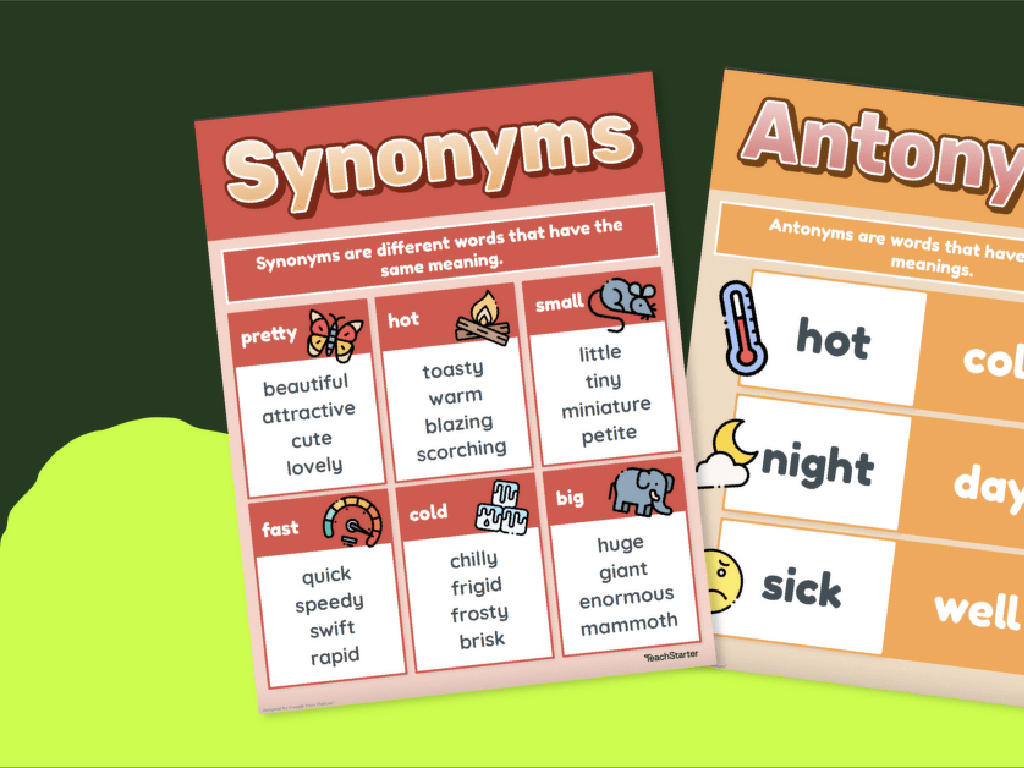Capitalizing Proper Adjectives, Nationalities, And Languages
Subject: Language arts
Grade: Fourth grade
Topic: Capitalization
Please LOG IN to download the presentation. Access is available to registered users only.
View More Content
Capitalizing Proper Adjectives, Nationalities, and Languages
– Capitalization highlights specifics
– Proper adjectives need capitals
– Adjectives from proper nouns like ‘American cheese’ or ‘Shakespearean sonnet’
– Nationalities & languages are capitalized
– ‘French’ in ‘French toast’ or ‘Spanish’ in ‘Spanish class’
– Review: Proper adjectives from nouns
– Turn ‘Italy’ into ‘Italian’, ‘Shakespeare’ into ‘Shakespearean’
|
This slide introduces the concept of capitalization with a focus on proper adjectives, nationalities, and languages. Capitalization is important because it distinguishes specific names and titles from general terms. Proper adjectives, derived from proper nouns, always start with a capital letter. This also applies to words used to describe nationalities and languages. For example, ‘American’ when referring to something related to America, or ‘English’ when talking about the language. A quick review of proper adjectives will help students understand that they are adjectives formed from proper nouns and should also be capitalized. Engage the class with examples and ask them to convert proper nouns they know into proper adjectives.
Capitalization: Proper Adjectives, Nationalities, and Languages
– Understanding Capitalization
– Capitalization means starting with a big letter.
– Reasons for Using Capital Letters
– To highlight importance and begin sentences.
– Examples of Capitalization
– Names, days, months, and starting sentences.
– Practice Capitalizing Properly
|
This slide introduces the concept of capitalization to fourth-grade students, emphasizing its role in written English. Capitalization is the use of uppercase letters to signify the beginning of sentences and to denote importance, such as in proper nouns. Students should understand that not all words need to be capitalized, only specific ones like names of people, places, days of the week, and months of the year. The slide also sets the stage for discussing the capitalization of proper adjectives, nationalities, and languages, which are derived from proper nouns and therefore require capital letters. Encourage students to think of examples and to practice writing sentences with proper capitalization. In the next class, review their practice work and reinforce the rules.
Capitalizing Proper Adjectives
– What are proper adjectives?
– Describes a noun, derived from a proper noun
– Proper adjectives are capitalized
– They always begin with a capital letter
– ‘Italian’ from ‘Italy’
– ‘Italian’ describes the restaurant and is from ‘Italy’
– Practice with more examples
|
This slide introduces the concept of proper adjectives to the students, explaining that they are words used to describe nouns and are derived from proper nouns, which are specific names of people, places, or things. Emphasize that proper adjectives, like the proper nouns they come from, always start with a capital letter. Use ‘Italian’ as a clear example, showing how it modifies ‘restaurant’ and comes from the proper noun ‘Italy’. Encourage students to think of other proper nouns and turn them into proper adjectives, such as ‘America’ to ‘American’ or ‘Shakespeare’ to ‘Shakespearean’. This will help them understand how to identify and use proper adjectives in their writing.
Capitalizing Nationalities and Languages
– Nationalities describe origins
– Example: ‘American’ from America, ‘Italian’ from Italy
– Languages are spoken forms of communication
– Example: ‘English’ in England, ‘Spanish’ in Spain
– Always capitalize nationalities and languages
– ‘French’, ‘German’, ‘Japanese’, and ‘Hindi’ are proper adjectives
|
This slide introduces the concept of capitalizing proper adjectives, specifically focusing on nationalities and languages. It’s important to explain to students that nationalities refer to where people are from, like ‘Canadian’ or ‘Mexican’, and these words are always capitalized because they are proper adjectives. Similarly, languages such as ‘Arabic’ or ‘Korean’ are also capitalized. Provide examples on the board and in worksheets, and have students practice identifying and capitalizing nationalities and languages in sentences. This will help reinforce the rule that proper adjectives, regardless of their position in a sentence, should always begin with a capital letter.
Capitalizing Proper Adjectives and Nationalities
– ‘French’ describes the chef
– ‘French’ is capitalized because it’s a proper adjective related to France.
– ‘Spanish’ is the language she learns
– ‘Spanish’ is a language name, so it’s always capitalized.
– ‘Canadian’ is a nationality
– ‘Canadian’ is a proper noun, showing a person from Canada.
– ‘English’ and ‘French’ are languages
– ‘English’ and ‘French’ refer to languages spoken in many countries.
|
This slide provides examples of proper adjectives, nationalities, and languages within sentences to illustrate capitalization rules. Emphasize that proper adjectives, like ‘French,’ are always capitalized because they are derived from proper nouns (names of specific places, people, or things). Similarly, languages and nationalities, such as ‘Spanish,’ ‘Canadian,’ ‘English,’ and ‘French,’ are capitalized because they are specific names. Encourage students to identify proper adjectives, nationalities, and languages in sentences and practice capitalizing them correctly. Provide additional examples and ask students to explain why each word is capitalized to reinforce the concept.
Let’s Practice Capitalization!
– Identify proper adjectives in sentences
– Look for adjectives derived from proper nouns
– Capitalize nationalities and languages
– Remember, names of countries and languages always start with a capital letter
– Rewrite sentences correctly
– Use what you’ve learned to fix the capitalization mistakes
– Share your answers with the class
|
This slide is for a class activity focused on practicing capitalization rules. Students will identify proper adjectives, nationalities, and languages in given sentences and rewrite them with the correct capitalization. Afterward, they will share their answers with the class to reinforce learning. For the teacher: Prepare sentences with common errors in capitalization for the students to correct. Encourage them to explain why certain words need to be capitalized. Possible activities include peer review of sentences, creating a classroom capitalization chart, or a game where students earn points for correct capitalization.
Class Activity: Capitalization Challenge
– Form groups for a poster project
– Create sentences with proper adjectives, nationalities, and languages
– Use words like ‘American music’ or ‘Italian food’
– Each group presents their poster
– Focus on correct capitalization
– Capitalize words like ‘English’, ‘African’, ‘Spanish’
|
This activity is designed to reinforce the rules of capitalization through a collaborative and creative exercise. Divide the class into small groups and provide them with poster paper and markers. Each group’s task is to come up with sentences that include proper adjectives, nationalities, and languages, ensuring they capitalize the appropriate words. Examples of proper adjectives could be ‘Mexican salsa is spicy’ or ‘She loves reading British literature.’ Encourage students to think of various nationalities and languages they are familiar with and use them in sentences. Once the posters are complete, each group will present their work to the class, explaining the capitalization rules they applied. This will help students learn from each other and reinforce their understanding of capitalization in a fun, interactive way. Prepare to offer guidance and corrections as needed.
Capitalization: Wrapping Up & Homework
– Recap capitalization importance
– Homework: 10 sentences creation
– Craft sentences using what we’ve learned
– Use proper adjectives, nationalities, languages
– Include words like ‘American’, ‘French’, ‘English’
– Correct capitalization is key
|
As we conclude today’s lesson, remind students why capitalization is important: it helps us understand what is special or important in a sentence, like someone’s name, a place, or a language. For homework, students will write 10 sentences that include proper adjectives, nationalities, and languages, ensuring they start each with a capital letter. This exercise will reinforce their understanding of the lesson and improve their writing skills. Encourage creativity and the use of a variety of words. In the next class, we can review some of the sentences to celebrate their efforts and correct any mistakes.






